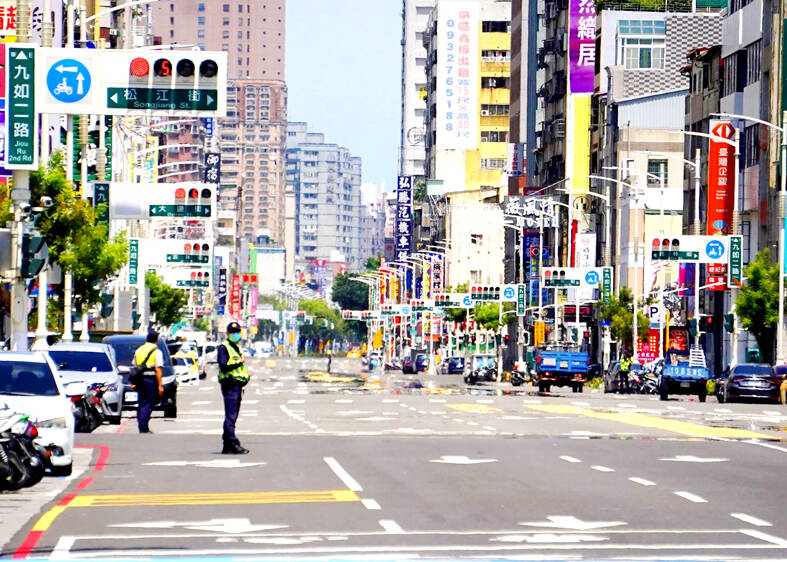The annual Wanan air defense exercise is to be held around Taiwan from July 22 to 25, and people are to be required to shelter in place when the drills are conducted in their area, the Ministry of National Defense (MND) said yesterday.
Air raid sirens signaling the start of the 30-minute drills are to sound at 1:30pm on July 22 in central Taiwan, July 23 in northern Taiwan, July 24 in eastern Taiwan and outlying counties, and July 25 in southern Taiwan, said Chu Sen-tsuen (朱森村), director of the All-out Defense Mobilization Office’s Manpower Mobilization Division.
Before and after the 30-minute drills, air defense drill alerts would be sent via text message to people’s mobile phones.

Photo: CNA
The alert would be in Chinese and English and read: “Incoming missile/rocket threat, seek immediate shelter” in English, Chu said.
The bilingual message announcing the conclusion of the drill would read “Air defense alert lifted” in English, he said.
Following air raid drills, local governments would stage another 30 minutes of drills to test shelter operations and check if utilities are working and supplies are sufficient, Chu said.
During the drill in Taipei on July 23, all buses, taxis, transfer stations and MRT stations would be required to temporarily suspend operations and passengers would be instructed to leave vehicles and move to designated areas, the Taipei Public Transportation Office said in a news release.
Buses would not be dispatched, and those already operating would be required to park by the side of the road or at bus stops, the office said.
Passengers would be asked to leave the buses and head to the nearest shelter, the office said.
Inter-city buses on highways would be allowed to continue driving, but would have to follow the same instructions if they exit the highway, the office said.
Also during the drill, taxi drivers would have to stop by the side of the road and not charge passengers for the time, the office said, adding that drivers should negotiate fares with passengers if a ride is to be interrupted by the drill.
For people with disabilities who need to use the city’s rehabilitation bus service, reservations are to be suspended from 12:30pm to 2:45pm, while vehicles already on the road would be required to stop by the side of the road.
The Taipei Metro would continue to operate, and passengers would be allowed to enter, but not leave stations, it said.
People riding YouBikes and using scooter-sharing services would also have to stop, it said.
The Wanan air defense exercise was first launched in 1978 to raise public awareness about emergency warnings and to reduce the possibility of casualties and damage if an attack were to occur.
Under the ministry’s zoning system for the drills, northern Taiwan includes Taipei, New Taipei City, Keelung, Taoyuan and Hsinchu City, and Hsinchu and Yilan counties, while southern Taiwan covers Tainan, Kaohsiung and Pingtung County.
The eastern and outlying areas cover Hualien, Taitung, Penghu, Kinmen and Lienchiang (Matsu) counties, while central Taiwan comprises Taichung and Chiayi City, and Chiayi, Miaoli, Changhua, Nantou and Yunlin counties.
In all of those areas, drivers would be asked to stop their vehicles during the drill and seek shelter with passengers while following police instructions.
Those who breach the rules could face a fine of up to NT$150,000.

An essay competition jointly organized by a local writing society and a publisher affiliated with the Chinese Communist Party (CCP) might have contravened the Act Governing Relations Between the People of the Taiwan Area and the Mainland Area (臺灣地區與大陸地區人民關係條例), the Mainland Affairs Council (MAC) said on Thursday. “In this case, the partner organization is clearly an agency under the CCP’s Fujian Provincial Committee,” MAC Deputy Minister and spokesperson Liang Wen-chieh (梁文傑) said at a news briefing in Taipei. “It also involves bringing Taiwanese students to China with all-expenses-paid arrangements to attend award ceremonies and camps,” Liang said. Those two “characteristics” are typically sufficient

The brilliant blue waters, thick foliage and bucolic atmosphere on this seemingly idyllic archipelago deep in the Pacific Ocean belie the key role it now plays in a titanic geopolitical struggle. Palau is again on the front line as China, and the US and its allies prepare their forces in an intensifying contest for control over the Asia-Pacific region. The democratic nation of just 17,000 people hosts US-controlled airstrips and soon-to-be-completed radar installations that the US military describes as “critical” to monitoring vast swathes of water and airspace. It is also a key piece of the second island chain, a string of

A magnitude 5.9 earthquake that struck about 33km off the coast of Hualien City was the "main shock" in a series of quakes in the area, with aftershocks expected over the next three days, the Central Weather Administration (CWA) said yesterday. Prior to the magnitude 5.9 quake shaking most of Taiwan at 6:53pm yesterday, six other earthquakes stronger than a magnitude of 4, starting with a magnitude 5.5 quake at 6:09pm, occurred in the area. CWA Seismological Center Director Wu Chien-fu (吳健富) confirmed that the quakes were all part of the same series and that the magnitude 5.5 temblor was

The Central Weather Administration has issued a heat alert for southeastern Taiwan, warning of temperatures as high as 36°C today, while alerting some coastal areas of strong winds later in the day. Kaohsiung’s Neimen District (內門) and Pingtung County’s Neipu Township (內埔) are under an orange heat alert, which warns of temperatures as high as 36°C for three consecutive days, the CWA said, citing southwest winds. The heat would also extend to Tainan’s Nansi (楠西) and Yujing (玉井) districts, as well as Pingtung’s Gaoshu (高樹), Yanpu (鹽埔) and Majia (瑪家) townships, it said, forecasting highs of up to 36°C in those areas